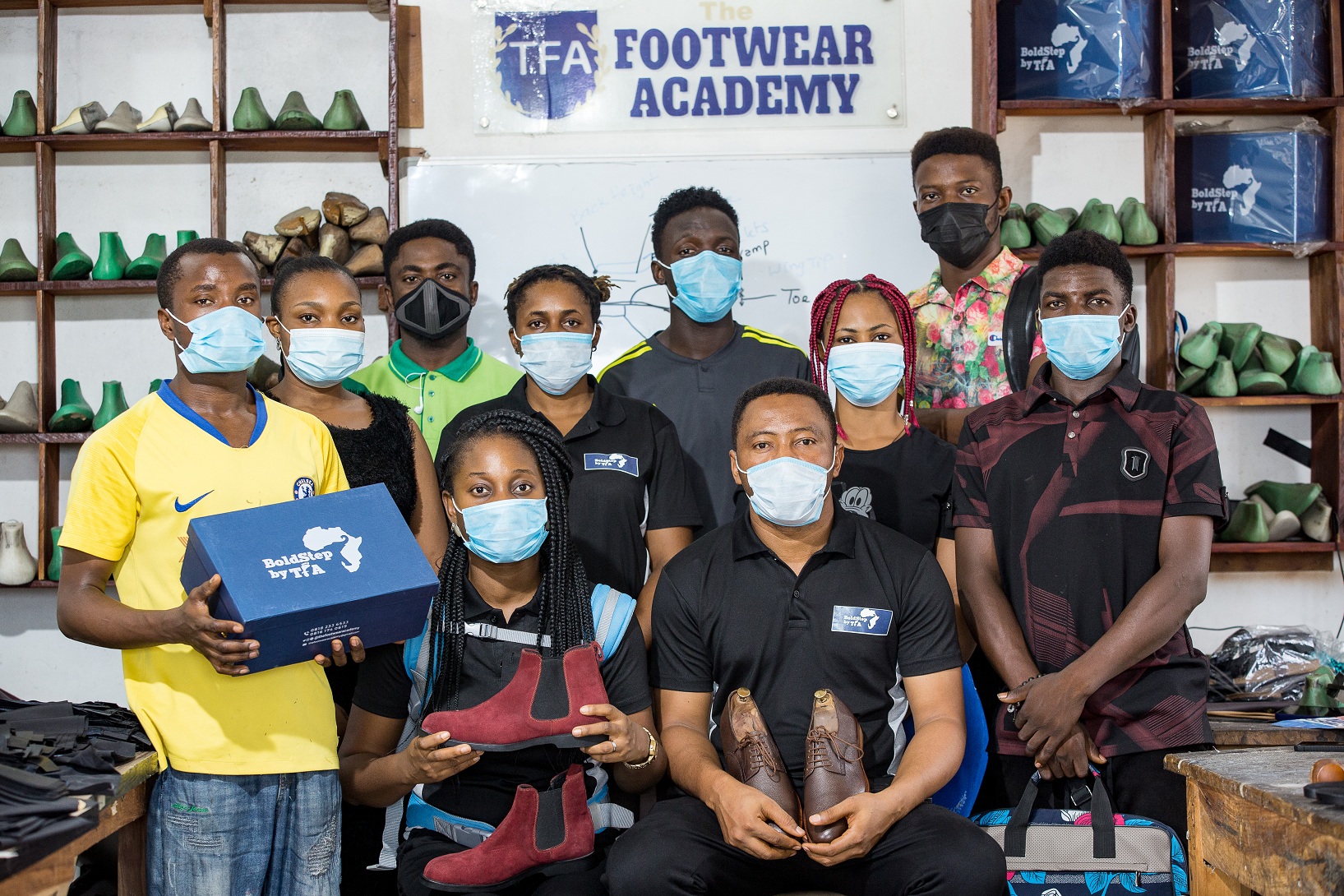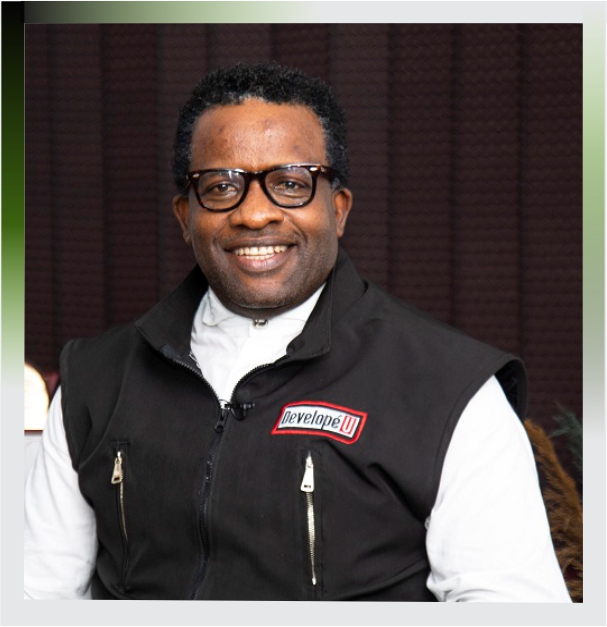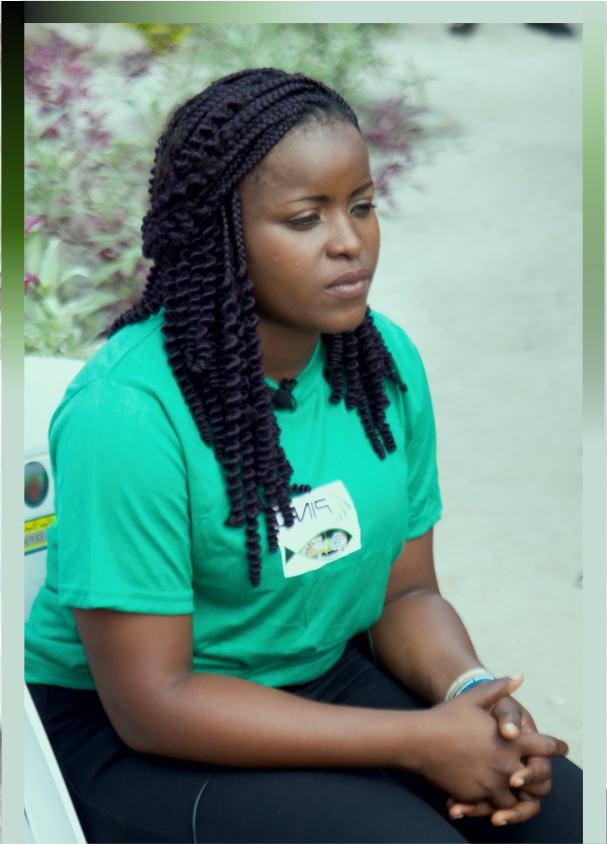

Summary of Outcomes in 2020
2,887
1,288
The NDYEP project’s
YOUTH JOB-READINESS, WORKFORCE DEVELOPMENT, & JOB CREATION
Our Niger Delta Youth Employment Pathways (NYDEP) project targets to empower young people in the region to attain market-relevant technical skills, vocational skills, and soft skills to secure waged employment or start an enterprise (SDG 4 & 8).

THE ‘SITTING DOWN AT HOME IDLE’ PHASE IS OVER!
‘’My name is Precious Ogbonna-Ben; I am from Abia State, a graduate of economics. I enrolled to learn leatherwork through the NDYEP training under the Footwear Academy. I got to learn a lot. I can make footwear for myself and for people, such as slippers and sandals. Before, I used to be at home, sitting doing nothing. Now, I can wake up in the morning, come to the Footwear Academy, and work because I have a lot of orders that I need to deliver.’’
The Niger Delta records some of the worst indices in youth unemployment, raising the need to find a working and sustainable model for getting the teeming youth population employed. In 2018, PIND and the Ford Foundation commenced a two-year NYDEP project pilot. It is based on a simple logic: a cohort of young people can become employed by targeting growth sectors developing and delivering skills development content (which incorporates technical, behavioral, and entrepreneurship skills) tailored to these sectors, and receiving post-training support into employment or entrepreneurship.
In the first year, PIND and local partner organizations with intervention sector expertise delivered in-person and practice-based experiential trainings to 1,468 youths. The trainees included women, PWDs (people with disabilities), and other marginalized groups in the three (3) states of Abia, Akwa Ibom, and Rivers. They were equipped with market-relevant technical and soft skills in the key growth sectors of agriculture, construction, and ICT (information and communications technology). The trainees received post-training support from the sector expert implementing partners that empowered them to get jobs as employees or to create jobs as entrepreneurs.
Although they were sector experts, PIND still invested in enhancing the organizational capability of the implementing partners from 2018 to 2019. We provided them with technical advisory support, linkage to existing resources, financial resources through small grants, and platforms for coordination and collaboration. These provisions served as veritable success enablers for the NDYEP objective and supported their ability to adapt when COVID-19 emerged.
In 2020, due to the COVID-19 safety guidelines, the designed physical trainings could not be delivered to target youth as planned. Through a series of virtual engagements, PIND assisted the implementing partners in adapting and migrating their entrepreneurship training and post-training support program to online platforms and formats. This included the online recruitment and orientation of youth trainees who were provided with access to internet data to ensure their participation. To support youths without virtual access, the partners held physical trainings with reduced class sizes. They also alternated the training schedule for participants to maintain physical distance.
With these adaptations, the sector-expert implementing partners successfully delivered technical and behavioral skills training to 1,416 youth in aquaculture, construction, ICT/renewables, and finished leather sectors in the three (3) pilot states. Additionally, to help the entrepreneurship-oriented trainees access funds for their start-ups, the partners assisted over 500 skilled youths in developing business plans, registering, and applying virtually for loans from the NISRAL portal. Some were being interviewed and assessed by NISRAL for possible loan disbursement as of year-end.
Now an Expert Farm Manager!
‘’My name is Blessing Samuel. I live in Rivers State. I got to know about the NDYEP training project through a friend who happened to be a member of the Rivers State Youth Empowerment ministry. Before I joined the PIND training program, I had no idea whatsoever with anything that has to do with aquaculture. In short, I felt when you talk about fisheries or talk about poultry. It had to do with farmers who are from the rural villages. The PIND empowerment training program has changed a lot of things for me.
I didn’t have a job from the onset, and it was difficult to get one (1) because I’m not a graduate, so there’s no certificate attached to me. But after the program, I could manage a farm; I could make a living out of it. So, a lot has changed. It has also changed my perspective; I didn’t have to go out there and start looking for a job. I could, actually, do something with the experience I’ve gotten from the PIND training; I can now rear fishes. I have an experience to start a fish farm, so I don’t have to depend on anybody to look for a job. I can create a job for myself and, also, for other people. So, that’s a huge change and a huge experience.
Presently I’m managing a farm, and that’s one (1) of my short-term goals. Managing a farm is giving me a vast experience. I get to manage the fishes. I get to manage the poultry that has to do with the birds, the layer birds in particular. I get to manage snails, and it has broadened my experience. Now, I am into farming fully. I want to say a big thank you to PIND and Aqua Green, who have implemented this program. I’m now looking at it that there is a brighter future.’’
Expanding the proven Niger Delta Youth Employment Pathways (NDYEP) demand-led approach for youth employment by adopting of the model or components of it by state governments was central to PIND in 2020. PIND shared its lessons and insights from the NDYEP model through one-on-one (1-on-1) meetings with key government agencies; via a virtual roundtable in July 2020 with government representatives from the nine (9) states of the Niger Delta; and via a virtual peer-to-peer learning forum in September 2020 with seven (7) Niger Delta states. During the September 2020 forum, the Lagos State Employment Trust Fund (LSETF), the Delta State Job Creation Agency, and PIND shared their experiences on reducing unemployment rates through efforts and investments in youths.
The forum utilized PIND-produced case studies documenting the learnings and recommendations for stimulating sustainable youth employment in the project sectors. By year-end, PIND completed a Delta State labor market assessment to generate planning data for a youth-employment program. At the same time, Akwa Ibom State partnered with PIND to mainstream the NDYEP soft skills training into the state’s My Entrepreneurship Goals Program (MEGP) and to foster closer links with NDYEP’s sector-expert-implementing partners in the state.
Before the forum in February 2020, PIND participated in an international job creation summit in Lagos, hosted by the LSETF with the theme: “Showcasing Leading Practices for Job Creation.” Sitting on the panel with top representatives from German Development Agency (GIZ), United States Agency Development Fund (USADF), British High Commission’s Prosperity Fund and International Labour Organization (ILO), PIND’s Deputy Executive Director shed light on the NDYEP model and its efficacy in youth job creation.




